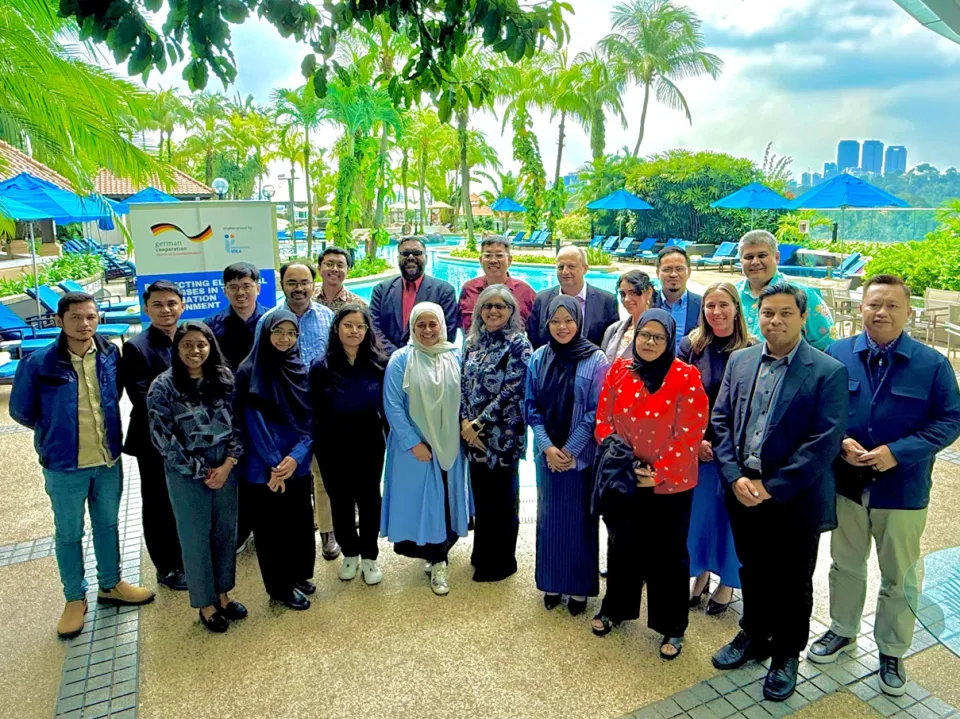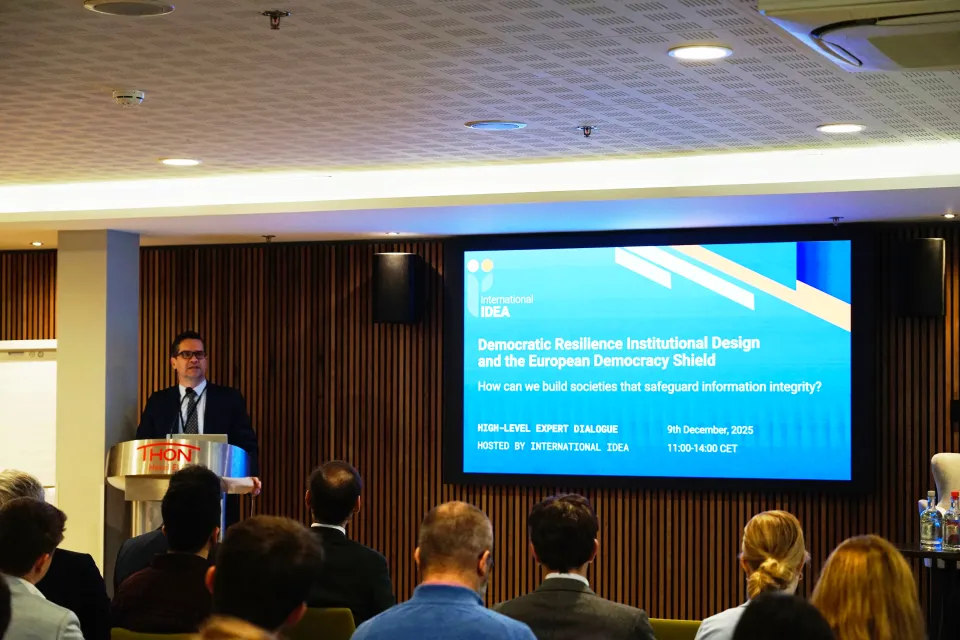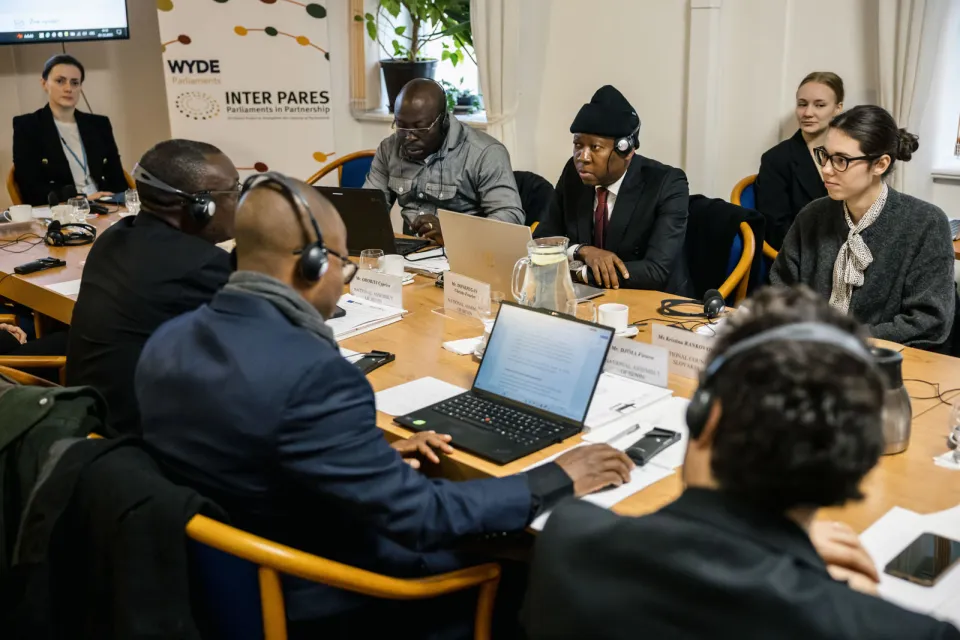Evaluating International IDEA’s Electoral Risk Management Tool in the recent general elections of Nigeria

The Independent National Electoral Commission of Nigeria (INEC) organized a workshop on 23 June in Abuja, Nigeria, to evaluate the impact of the Electoral Risk Management Tool (ERMTool) developed by International IDEA during the recent general elections. For more than a year now, INEC has been implementing the ERMTool with technical and advisory support from International IDEA and the African Union.
The ERMTool was launched by International IDEA as a global public good in 2013 to empower those who have immediate responsibility, or specific interest to prevent and mitigate election-related risks. Users include electoral management bodies, security sector agencies, civil society and other state and non-state actors. The ERMTool aims to help building users’ capacity to understand, analyse, prevent and mitigate electoral risks, in particular those that may trigger or contribute to triggering election-related violence.
Given the historical concerns surrounding the possibility of election-related violence in Nigeria, INEC decided to implement the ERMTool during the 2015 electoral cycle. To implement this project, INEC established an Electoral Risk Management unit based at its headquarters in Abuja. The ERM unit was responsible for organising project activities: collecting & analysing risk data, generating risk alerts and maps and following up on recommendations for prevention and mitigation actions.
The ”Preventing Conflict and Electoral Violence in Nigeria” project is funded by the Ministry of Foreign Affairs of the Netherlands, the African Union (AU), the Government of Norway and International IDEA through a Joint Activity Plan with the AU. Following the successful conduct of the 2015 general elections in March and April 2015, INEC decided to organize a workshop in Abuja to present its Electoral Risk Management report and to evaluate the impact and added value of the ERMTool.
The workshop in Abuja was the final activity planned under the current project and aimed to assess the impact the project and to make recommendations for the future of electoral risk management at INEC. It brought together INEC Commissioners and officials from headquarters, INEC electoral management state desk officers from each of the six geopolitical zones, representatives from four different security sector agencies that were part of the Inter Consultative Committee on Electoral Security (ICCES) as well as civil society organizations, academics and the international community including representatives from the Dutch Embassy (the main donor) and the Swiss Embassy (IDEA Chair).
The workshop was officially opened by Professor Attahiru Jega in one of his final acts as Chairman of INEC – his mandate ended on June 30. He thanked International IDEA and the other partners for accompanying INEC during the electoral process. Africa Regional Director Adebayo Olukoshi, Ph.D. also spoke during the opening ceremony and commended INEC for its role in helping bring about an historic transition in Nigeria.
The morning session was dedicated to lessons learned from the project and participants worked in groups to assess the strengths and weaknesses of the project with regards to the projects four main objectives: improving INEC’s understanding of electoral violence, strengthening INEC’s capacity to collect and analyze electoral risk data, improving INEC’s coordination with electoral stakeholders and enhancing INEC’s understanding of the outcomes of prevention/mitigation actions. The afternoon session was dedicated to the future of electoral risk management within INEC. The session was opened with a presentation by International IDEA’s Nicholas Matatu on Electoral Risk Management frameworks around the world before participants deliberated on the future of Electoral Risk Management in Nigeria.
A number of recommendations were developed for the incoming INEC Chair to consider, regarding data collecting, raising awareness and a call for broadening the pool of stakeholders, but the participants overwhelmingly recommended that electoral risk management be institutionalized, with permanent staff dedicated to manning an electoral risk management unit at both the national level and in each of Nigeria’s 36 states. The recommendations will be included in the final project report by INEC.
In the next few months, Nigerian president Muhammadu Buhari will nominate a new Chair as well as several new Commissioners to lead INEC over the next five years, subject to confirmation by the Nigerian Senate. As the new leadership settles into its role, International IDEA will continue to collaborate closely with INEC to review the recommendations on electoral risk management and provide advice on their implementation. With governorship by-elections in Kogi State and Bayelsa State scheduled for November and December 2015 respectively, the new INEC Chair will soon have the opportunity to assess the effectiveness of the ERMTool firsthand before beginning the broader task of outlining INEC’s strategic priorities for the new electoral cycle.



